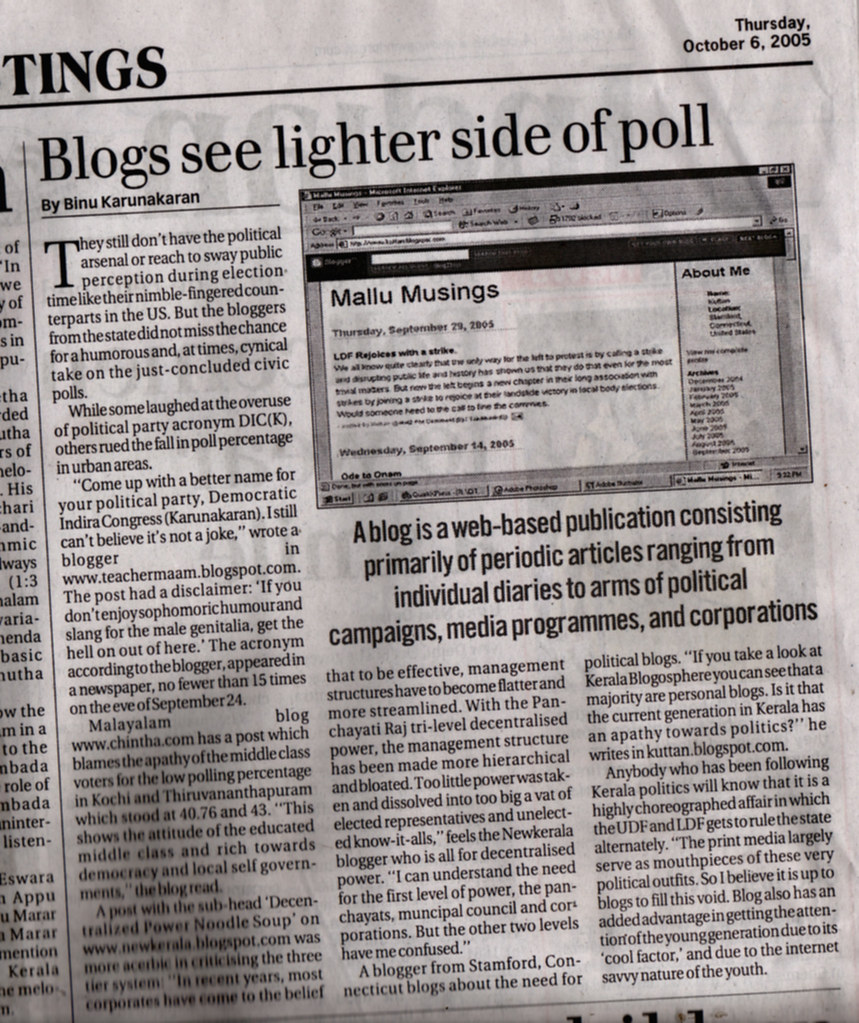Monday, October 31, 2005
Gazing into the crystal ball
In the Sept./Oct. 2005 issue of Foreign Policy, the publication -- "to mark our 35th anniversary" -- asked a number of luminaries "to speculate on the ideas, values, and institutions the world takes for granted that may disappear in the next 35 years."
Some of the articles require registration (or even a subscription), but others are accessible.
Excerpts of note:
"It’s ironic that the Web once seemed to promise individuals new opportunities to explore the world without showing their face. Instead, it is turning out to be a powerful force against anonymity. ... In effect, people are trading anonymity for a voice. ... As anonymity fades, a critical question will remain: Are we getting as much as we’re giving up?" Esther Dyson, editor of Releasen 1.0 (a CNET publication), in "Anonymity"
"The private domain will swallow the public domain. And the cultivation of culture and creativity will then be dictated by those who claim to own it. ... Our leaders...have been seduced by a vision of culture that measures beauty in ticket sales. ... They can’t imagine that freedom could produce anything worthwhile at all. The danger remains invisible to most, hidden by the zeal of a war on piracy. And that is how the public domain may die a quiet death, extinguished by self-righteous extremism, long before many even recognize it is gone." Lawrence Lessig, Stanford University professor, in "Public Domain"
"Thirty-five years from now, the illicit professionals who remain in the business will be custom drug designers catering to the wealthy. Their concoctions will be fine-tuned to one’s own body and neural chemistry. In time, the most destructive side effects will be designed out, perhaps even addiction itself." Peter Schwartz, chairman of Global Business Network, in "The War on Drugs".
"Monogamy, which is really no more than a useful social convention, will not survive. It has rarely been honored in practice; soon, it will vanish even as an ideal." Jacques Attali, Foreign Policy contributing editor, in "Monogamy".
Some of these (the end of monogamy, in particular, and the end of the drug war) strike me as untenable in 35 years. But who knows -- maybe in those three decades I'll look like Charles H. Duell, the commissioner of the US Office of Patents who in 1899 infamously said, "Everything that can be invented has been invented."
Your thoughts?
Kerala Kalamandalam
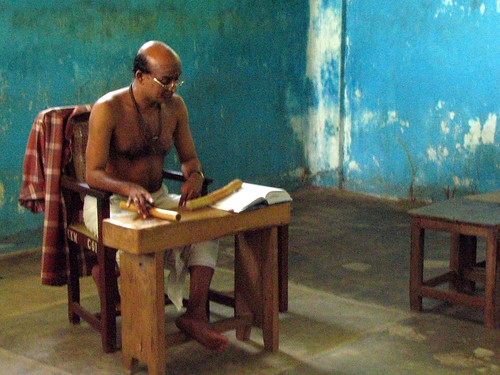
Preach on, teach. Grainy due to limitations of current camera.
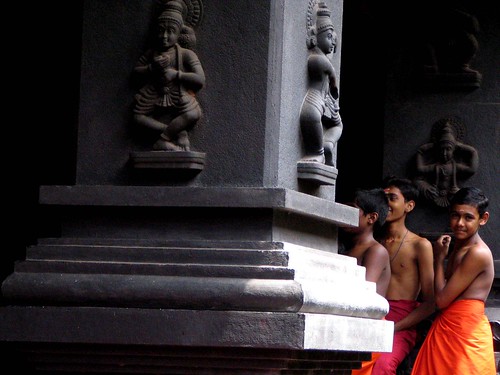
These little boys watch fellow students perform (or, in the case of the boy meeting my gaze, wonder why the white girl is focusing her lens on him).
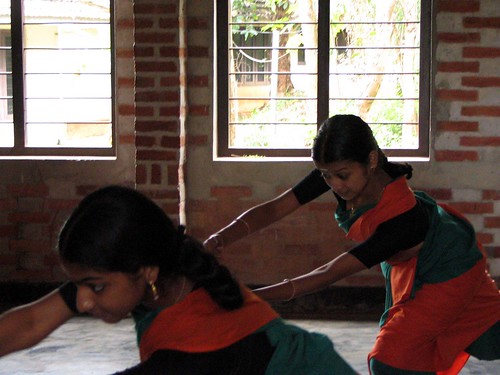
Not a terrific exposure, but I love the lines their arms create.
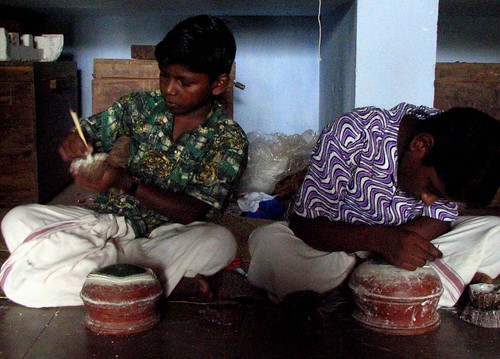
Great shirts, yeah? These boys are learning how to apply kathakali makeup by simulating the procedure on upturned pots.
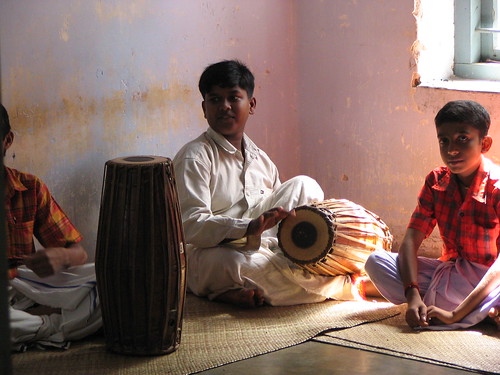
The kalaris (school rooms) were great open-air spaces that let in perfect light.
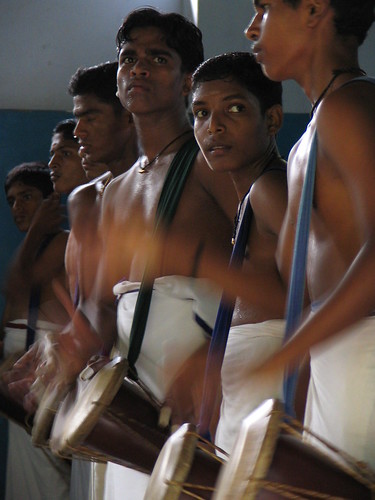
I just loved how perfectly still their upper bodies are, while their hands move so quickly.
A great place -- visit if you can. I usually don't go in for this touristing stuff, but I guess I would make an exception in this case.
The stinking rose
Buy a TV, get 10 kg onions free
Amritsar: A shopkeeper in Amritsar is offering 10 kg of onions free on buying a television set from his shop.
"Onion prices touched Rs 30 a kilo, which was unheard of. So we are offering our customers 10 kg of onions with a purchase of a television set. The response is really very good, " the owner says. Onion baskets are neatly arranged with the colour television sets, available in the price range of Rs 8,000 to 17,000 in the shop.
Since the announcement came, customers are making a beeline at the shop to buy the television sets and get their share of booty.
1) Hah! They said booty.
2) If these customers can afford a TV that costs Rs 17,000, is Rs 30 for a kilo of onions really that hard to swing?
Happy!
Thus:
Happy birthday! (To my grandfather, born Oct 31. Here's to you, Boompsy!)
Happy Halloween! (Pagan ritual or not, I love candy. And dressing up in costumes.)
Happy Diwali! (Be safe around those firecrackers!)
Eid Mubarak! (Enjoy!)
Sunday, October 30, 2005
Delhi blasts
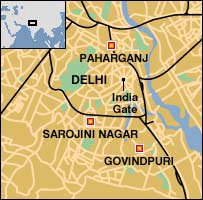
They're estimating that more than 50 people have died after three bomb blasts rocked markets in Delhi. For a good synopsis, see the BBC story or the CNN story.
Paharganj -- near one of Delhi's railway stations, and a great place for foreign backpackers to score drugs (or so I hear) -- was hit, in addition to Sarojini Nagar. Sarojini is a sprawling market I've always loved for its delightful export seconds, and also attracts a goodly number of tourists.
Lots of people were out shopping in preparation for Eid and Diwali, which...of course, the destinations were targeted in a calculated decision.
No one I know was hurt, but a few of my friends were ostensibly covering the carnage. It's still incredibly difficult to make sense of; actually, I suppose there's no reason even to try and make sense of what is being called a terrorist attack. In the words of a photographer who spent the night shooting, "I don't want to talk about it. It's so stupid. No one is taking responsibility for it, and in a few days no one will even care anymore. They'll just forget that it happened. Except, of course, for those whose friends or relatives were killed."
It's a disspiriting thought, but really, I have to agree with him. The media will cover it for a few days, then it will fade into the annals of history. Another bomb will explode, or another train will derail, or the earth will shake again, and we'll move on to the next big thing. It is particularly difficult in this case to be a journalist covering the event. On one hand, you're being incredibly insensitive, barging into a tragedy, asking people to share their lives when they already have death and depravity and longing to deal with. On the other hand, you're just doing your job, a job which, in some way, if you forget about all the corporate bullshit and whatnot, is about telling the stories of those who would otherwise be consigned to the margins. How, how do you weigh the two impulses? Are you a god or a monster?
But beside these considerations, I am personally divided. I am, of course, an American citizen. I remember 9/11 as if it were yesterday, but it was all in the abstract. I knew that the planes were an outright attack on the idea of America; still, I didn't know what I thought of America, if I thought of America, and I really had no concept of New York, having never visited the place.
For me, these blasts are much more personal. I cannot, of course, compare the two events in terms of magnitude -- it would be cruel. But I've been to Paharganj, I've been to Sarojini. When my friend describes where the bomb exploded, I can visualize the juice stand that he is talking about, by the two shoe stores that are always crowded by women shoving each other to get the latest in hooker footwear, all stacked heels and see-through straps. For me there is more at stake in Delhi, there is more...more there for me than in New York. And thus I am saddened, worried, about what this all means.
If it means anything at all.
Saturday, October 29, 2005
Pretty damned admirable
But you, Manmohan Singh, you're pretty fuckin' classy. (And no, I am not being sarcastic. I just like to curse.)
"No Diwali gifts please, says PM"
NEW DELHI: Prime Minister Manmohan Singh on Friday appealed that no gifts or sweets be sent to him this Diwali . People should rather donate money to the Prime Minister's National Relief Fund in view of the October 8 earthquake. — PTI
Not too shabby. Now, I know I've only donated a pittance, but...do something. Even if you're American, even if you don't have much. Every little bit helps -- people shouldn't die because there isn't enough aid to continue running helicopters to areas affected by the earthquake.
Thursday, October 27, 2005
Ah, Hinglish...
I forgot how to make a link, so just copy and paste and enjoy.
http://www.numair.com/2005/10/indian-techie-flamewar.html
Yeah, it's probably umm, not so culturally sensitive. But it is pretty fucking funny, and it's the kind of stuff I deal with all day long (minus the comments about fucking from behind).
"You are mental sick....I know rishi chadda will not call me and apologize. Just you will shout like a road chaap mad dog.i knows what my status is. But do you know what your status is? You call every person like somendra, Rajneesh request for joining company and after Barks like a dog."
Good English or not, I love the righteous vengeance this person envisions he is exacting with such a seething e-mail.
Tuesday, October 25, 2005
Insensitive Indian Journalism, Example No. 5,672
"DUMB CASE
A case was filed against 24-year-old Nasir from Ottapalam for having inconvenienced rail passengers by making a din while selling audio cassettes. But when questioned in courst, he could only reply in gestures; the man was dumb! So much for the case."
As if the content wasn't objectionable enough (one: why call him dumb when there are words for whatever condition he suffers from? and two: isn't this exposing some community prejudice toward the poor boy who cannot help his condition?), the blurb is accompanied by a cartoon of a boy in a straitjacket, mouth open and tongue out. Bad, bad, bad.
Monday, October 24, 2005
These people...
Coming back to work after a vaca is never exciting, but man...it's been an unpleasant week and a half. There was vomiting, sitting in a puddle of vomit for 12 hours, there was sleeplessness and there was a flat tire. Please, please people: I need a break! Just for one day!
A haha...
And, in case the link doesn't work, here we go...
The News Isn't Good Enough
Bishwanath Ghosh
A fact of life: the English left our shores nearly 60 years ago but the urge to learn their language never left us. On the contrary, it is tightening its grip every passing year - today even the accent in which the English is spoken matters, thanks to call centre jobs. Nothing wrong in that. In a country like India where the number of dialects spoken is about three times the numbers of days in a year, it doesn’t help at all to be proficient just in your mother tongue. Hindi might be the national language but learn Hindi alone and you could at best be a Hindi teacher in some government school.
You might have often observed in public places such as restaurants or train compartments: a mother speaking to or rebuking her child in English. The confused child keeps slipping into its mother tongue, but the mother would stick to the English she knows. There are two reasons for her doing so - one, to demonstrate to the people around that she isn't a village woman; two, she genuinely wants the child to learn the language.
There was a time when parents had another handy device to make their wards learn English -the newspaper. The Midnight's Children will tell you how their class teachers asked them to read Calcutta's Statesman, which had a British editor even after the British had left and which was then reputed for its impeccable use of the language. Many Calcuttans still accord God-like status to Desmond Doig, the legendary editor of Junior Statesman, who once had a copy rewritten 27 times by the reporter before considering it fit for publication in JS.
Many other Indian papers also had, at the time, larger than life editors who could teach an Englishman a thing or two about the use of the language. And they also had their Doigs - faceless, nameless news editors who spent evenings peering over type-written copies in their tiny, musty cubicles. Several generations of journalists honed their skills under the tutelage of these Doigs, producing newspapers that could indeed be considered the last word as far as the usage of the English language went. The Express, in Chennai, had its Doig in C P Seshadri, more popularly known as Master - an old-world but apt nickname because he could make others in the newsroom feel like a schoolboy. That's how you were those days: a nervous kid who considered it safe to deposit his ego at the doormat before entering the newsroom.
Today you might trust a journalist to give you the news, and maybe the news behind the news. But you can no longer trust him, or her, to teach you English. That’s because these days, journalists aren’t made. They are manufactured, by the expensive journalism and creative-writing schools that have sprung up in every respectable city today. These schools, instead of puncturing egos, only seem to be inflating them, so much so that there is no space for the real education that comes along with the job.
So these days you have someone trying to write like Marquez, and someone else trying to ape Hemingway (and none of them are likely to have read the journalism of these giants, only literature). And those who don't read books write as if they are still writing for their college magazines, thinking that's their ‘style’. Both varieties - they are usually people in their 20’s - are extremely touchy about their writing: they would often want to know why their stories were edited or cut. They don’t care to remember the advice Chekhov gave about story-writing: after you have written your story, always cut out the first and the last paragraphs, because often they are the most pompous.
But who is there today to puncture egos and show the way to the youngsters? You can only lead by example, and here is an example of bad English and the worst kind of journalistic writing - the introduction of the lead story in the recent issue of a leading national newspaper which takes itself very seriously. “Islamabad: Even as it became clear that the death toll in Saturday's earthquake in Pakistan and Pakistan-occupied Kashmir (PoK) could be well over 30,000, Islamabad on Monday said it would receive relief goods from India.”
The introduction is so convoluted that it serves as a shining example of how not to write. It is the journalistic equivalent of illiteracy. But such writing is commonplace these days. Properly put, the sentence would read something like this: “Pakistan on Monday said it would receive relief goods from India to help victims of Saturday's earthquake that devastated parts of the country, killing more than 30,000 people.”
Is it laziness that is allowing the murder of the language? Or is it merely incompetence? Whatever the case, the news doesn’t seem to be good for either budding journalists or readers aspiring to enrich their language. It looks as if the guardians of the language are now sitting outside the newsrooms. I have three friends whom I turn to for advice or assurance whenever I am stuck with a piece of writing. They are all women in their twenties - one is a surgeon, another a teacher, and the third an architect.
bishwanath_g@yahoo.com
Friday, October 14, 2005
Jet-setting
I am flying to Delhi tomorrow, staying until Tuesday, flying back to Cochin, hopping on a bus to Thrissur, bopping around to Kodungallor, then returning to Kottayam by next Sunday.
Weeeee.
Lingua franca
Anyway, I found this pretty interesting. Mmm, statistics! About languages spoken in the US! Hoo boy, good times.
(Disclaimer: I think this US English Foundation is dedicated to enforcing English as THE national language. You know, by, like, calling Mexican immigrants "beaners" and telling them to go back to their own damned country. Note the Theodore Roosevelt quote tacked to the bottom of the page: "The one absolute certain way of bringing this nation to ruin, or preventing all possibility of it continuing to be a nation at all, would be to permit it to become a tangle of squabbling nationalities. We have but one flag. We must also learn one language and that language is English.")
Also, did you know Oregon (represent, Beaver state!) is the fifth most linguistically diverse state in the nation -- with 138 languages spoken by residents? Crazy! (It follows California, New York, Washington and Texas.)
It's strange, because I conceive of India as such a linguistically diverse country (there are, what, 19 recognized regional-national languages?). But in my own dear home, diversity is all around as well. Much love for my maligned nation!
We could all be a bit more diplomatic
It goes over how to present bad news, offers tips on how to give good news, what to say when the news is uncertain, advice for listening and collaborating, and a hodge-podge of other useful notes.
Some good points?
"In managing people’s outrage, what you say is less important than what they say. Shut up and listen." (from #24, "Talk less, listen more")
"People feel more understood when you empathically say you don’t understand than when you smugly say you do; try murmuring “I can’t really imagine what that must be like.” For similar reasons, think twice before you tell a story about how you once faced a similar situation. This might be the perfect way to show you get it — or it might feel like you’re changing the subject from their grievances to your life history. Don’t steal the stage, and don’t claim too much understanding." (from #28, "Be careful how you connect to what you are hearing")
"I’ve used the word “acknowledge” a lot in this list already. Like “location” in real estate, acknowledgment is the core of managing outrage. Acknowledge what went wrong; acknowledge what your stakeholders think went wrong; acknowledge what it is about you that makes them want to think so. ...when the audience is already against you, or is likely to listen hard to your opponents later, then you’re doing outrage management — and acknowledgment is the name of the game." (from #43, "Acknowledge acknowledge acknowledge")
A little dry, yes, and overly dependent upon jargon, but lessons we can all be reminded of from time to time.
Ig Nobels!
But what I'm really interested in is the Ig Nobels.
So much love for the absolute absurdity of all this. Prizes awarded include:
- Agriculture: James Watson, for his scholarly work "The Significance of Mr. Richard Buckley's Exploding Trousers"
- Medicine: Gregg A. Miller, for the creation of Neuticles, prosthetic testicles (available in three sizes and three degrees of firmness) for your neutered dog
- Literature: Nigerian spammers, for their creation of an epic sent to millions of readers, petitioning them for just a bit of expense money
- Chemistry: Edward Cussler, for his study "Will Humans Swim Faster or Slower in Syrup?"
Good times.
Thursday, October 13, 2005
Vidyarambham
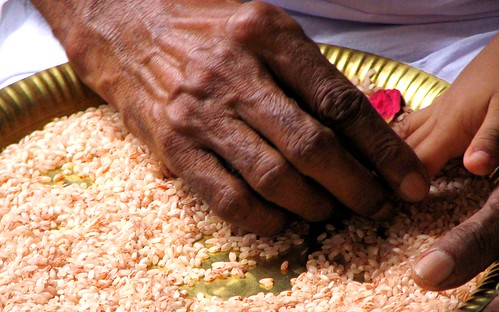
Now, I tend to feel a little out of place at "cultural events" here because often, they're these manufactured tourist traps that make everyone a little uncomfortable.
But living in Kerala offered me the chance to see first-hand a really cool even on Wednesday that I otherwise probably would have written off or not been aware of.
Vidyarambham is a sweet little ceremony conducted for children to be inducted into the world of letters and learning. As such, the children are taken by teachers and shown how to write their first Malayalam characters in a bed of rice.
Enough description -- the pictures really are much more interesting.
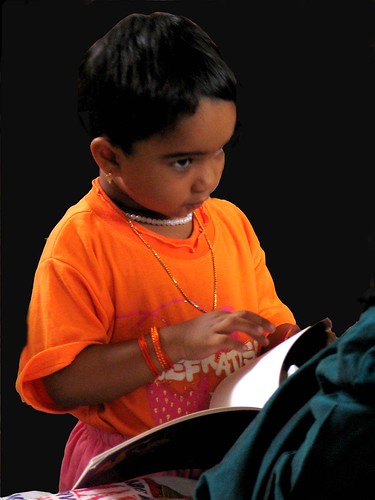
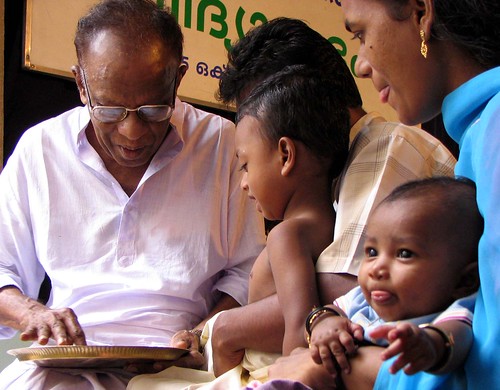
A few notes: The girl in orange definitely looks like she's about to say, "Whatchoo talkin' 'bout, Willis?" And I love the family portrait because if you look closely, mother, baby, and young boy all have their tongues sticking out. It's a family trait.
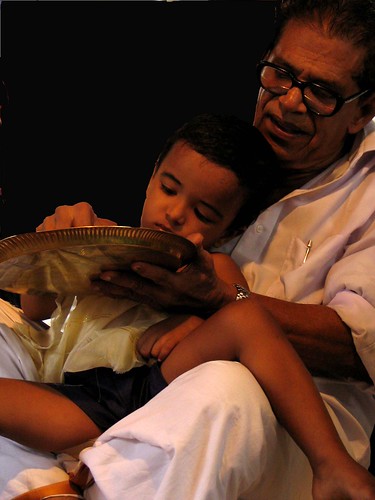
The boy's posture here is great. He is so at ease with his tiny little body!
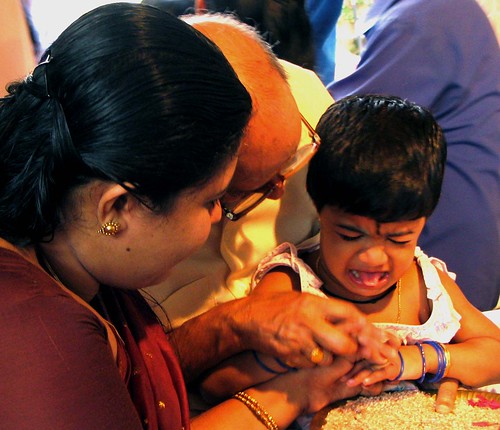

The childrens' reactions to the ceremony varied. Some were stoic (right); others, fussy. It's kind of like the annual mall pilgrimmage, a Hajj for Santa's lap -- sometimes you win, and the kid has a good time pulling Santa's beard; other times, it's picture after picture of a screaming mess.
Wednesday, October 12, 2005
The stars say...
Scorpio (Oct 24-Nov 22)
Unmarried? Look around; you are sure to land the spouse of your dreams. A legal suit will have to be compromised. Some of you will develop an interest in the world of the occult. Be diplomatic in your professional life as it will help you climb the ladder. Journalists, a bit of investigation could bring out a scoop. Ailments of the eye might trouble some of you.
I hope that eye ailment won't get in the way of snagging myself a hottie and splashing something juicy on the pages of an international magazine...
Changing tastes
"The times are a-changing. The 'parippuvada' (dal vada), tea and bidi were as much a symbol of the comrades in Kerala as is the sickle. But apparently, the steady march of globalisation has not left the Lefties untouched.
At a recent press conference at the CPI(M)'s Thiruvananthapuram district committee office following its victory in the civic polls,t he 'parippuvada' was replaced by hamburgers."
Oh, those damned capitalists! What will America do next to our holy, holy traditions.
Also, I wonder if they were REAL hamburgers, like cow hamburgers -- and if so, what that means. Hrmmm...
International news comparisons
It's a matter of pride for US newspapers to publish every single day of the year, much to the chagrin of newspeople with families -- they well could find themselves working on Christmas or New Year's or any other festive day. Hell, even with Hurricane Katrina in New Orleans, the Times-Picayune made it a point to pick themselves up by the bootstraps and at least publish an online edition of the paper, though their offices were destroyed.
Which is why I'm so grumpy that a pooja day or something prevents me from reading The Hindu or The New Indian Express. I know, I know, most Americans no longer cherish the traditions behind the holidays, and perhaps Indians do. Perhaps the holidays are more meaningful here, more grounded in some communal experience.
But dammit, I want my Sudoku.
Is that being culturally insensitive?
Monday, October 10, 2005
On Indian blogging/bloggers
Friday, October 7, 2005
Open dictionary?
Entries thus far seem to fall into four categories: Stupid, unintelligible, superfluous or delightfully clever.
STUPID:
cornerize (verb) : To trap in a corner.
I tried to get away but sissy cornerized me.
dunch (noun) : A meal that is ate around 3 pm that is your dinner
This is my dunch.
UNINTELLIGIBLE:
Surdusphile (adjective) : An obession and sexual perversion to deaf ways, deaf culture, hearing aids, sign language, deaf accents of voices, and want to become deaf. Surdus is latin for deaf. This can be a healthy obession when it does not involve harming yourself, the cultures, and inviduals.
my ex boyfriend is a surdusphile because he gets way over in his head about my deaf voice and much more.
Frindle (verb) : To create a new word and convince people to use it.
That's not a real word, you are just frindling again! —Andrew Clements- he did not use the word in this way, but told the story of the first Frindler, Frindle, 1996
Biggity Swiss (noun) : totally awesome, basically pretty sweet
your hair is tres biggity swiss —Scattered and Smitten, none, 05/10/2005
SUPERFLUOUS:
lol
(abbreviation) : An abbreviation for the words laugh-out-loud
THat was hilarious. LoL
(other) : abbrevation for Laugh Out Loud
That dumb speech was just lol.
hairdon't (noun) : A really bad hairdo.
She went to the beauty salon and came home with a hairdon't! —me!
X-16 (noun) : AN AIRPLAIE
DELIGHTFULLY CLEVER:
bangalored (verb) : The process of losing your job because it is outsourced to Bangalore(a city in India), used esp. in United States recently because many jobs were outsourced to Bangalore.
Nick was sad when his job was bangalored. —Young World,The Hindu
qualifiction (noun) : A made-up or exaggerated qualification, usually on a job application or CV.
In hopes of obtaining a position beyond her abilities, she sprinkled her job application with qualifictions.
logonym (noun) : a brand name product's name used to name similar products.
Hand me a kleenex, Put a bandaid on the cut, are examples of logonyms. —Mike Jam, used in his classroom lectures, cira 1995
It's an interesting experiment, I suppose. Part of me wonders whether people are adding these in earnest, or if they're just doing it for giggles (why they would waste the time is beyond me, but...). And, furthermore...if they are doing it for giggles, what happens when these words come into common parlance?
A cool Web site
And they've just debuted a pretty cool new site, WriteBoard. I think I like it, mostly, because it reminds me of my heyday on the Daily copydesk, working with the splendid Quark CopyDesk.
The site boasts, "WriteBoards are shareable, web-based documents that let you save every edit, roll back to any version and easily compare changes. Use WriteBoard to write solo or collaborate with others."
They add:
"Writeboard makes it easy to...
Write without fear of losing or overwriting a good idea
Compare different versions of a document
Collaborate with colleagues on copy, proposals, memos, etc.
Subscribe to documents via RSS and be notified of changes
Keep your writings organized with Backpack integration...
Writeboard is perfect for...
Authors, journalists, PR folks, editors, and publishers
Bloggers or freelance/independent writers
Letter writers, songwriters, poets, comedians, creatives
Students, professors, and groups collaborating on a paper"
The basic schtick of WriteBoard is that it's a collaborative site for editing and writing. I can think of a lot of times when I'm travelling or whatnot and want to continue writing, but don't want to lug my dinosaur laptop around, when this would be especially useful.
Cool beans. I haven't tried it out yet, but it's imminent.
Things that aggravate me, Friday edition
Witness The Hindu's "Friday Review" section, which includes the story, "Friendship matters/Vinayan is canning his latest film 'Boyy friennd,' which has new faces in the lead."
At first I thought, "Typo? Could it be?" But no, the text explains...
The room on the first floor of the Chalakudy Rest House has got a face-lift. There are a few posters of Sania Mirza, George Michael, Steffi Graf and the gorgeous Jennifer Lopez. Thrown in are a few clothes, books, a computer and a couple of beds and the room is transformed into one in a girls hostel.
This will be the hostel room of actors Madhumitha and Honey in Vinayan's forthcoming film, "Boyy friennd," spelt with an additional 'y' and 'n' to make "the title sound more cute".
Ow. That crap makes my head hurt. (Also: Minus five points for the obligatory references to Sania Mirza and "the gorgeous" Jennifer Lopez.)
Thursday, October 6, 2005
As a courtesy...
- I am an American.
- I am living and working in India.
- I consider myself a writer.
- I secretly love Keralan food but sometimes pretend that all the coconut makes me want to puke.
- I could probably be considered a feminist.
- I'm not afraid of throwing punches.
- In "the real world" (which, in my brain, usually excludes India...foreigner's bias) I am brash and annoying; in the subcontinent, I become a meek supplicant.
- I spend the majority of my day reading newspapers, perusing websites, and devising schemes for rocketing towards fame.
- I want to remain anonymous.
So I guess...that's a start. I don't want to say too much, and I don't want to say too little. Let this suffice.
Oh, Indian journalism
Indian journalism is close to becoming a joke, but no one is laughing
C P Surendran -- Senior assistant editor, The Times of India
What are the challenges faced by the Indian media today?
Indian journalism is now very close to becoming a joke. But no one is, as usual, laughing. One of the things the new crop of journalists and the new brand of journalism have done is to make PR people run for cover. In Mumbai and other big cities you will see a lot of well-dressed people walking around in tears. These are the PR babes and boys. They have been done out of their jobs. By who? By journalists, who else? Time was when a firm or product wanted publicity, they called up an agency. No longer. Now they call up Athena, where the journo is as usual breaking ice with some celeb shit, who is struggling to come to terms with her cleavage, or his pumped up biceps, the most intelligent part of his well-toned anatomy. The other problem is one of monopoly. There are just not enough voices in the media to lend it a representative democratic character. The biggest paper in India doesn't have an arts/culture page. Which means opinion and other forms of intellectual discourse are not anywhere on the radar. The effort has been of late to make news entertaining, which means page three is very often as good or bad as page one. The Indian media needs more capital and more voices to break the hold of the monopoly syndrome. There is not one experiment right now happening in the media world. Fuck knows when that's going to change.
How would you rate Indian journalism on a scale of one to ten in terms of credibility, quality and personnel?
Four for credibility. Five for quality. Four for personnel.
Despite journalism in Indian languages coming of age, the English-language media in the country continues to dominate its vernacular cousins. What's your view on this?
That's not quite true. In Kerala, Malayala Manorama is a much bigger paper than any English paper can ever hope to become in the foreseeable future both in terms of readership and ad revenue. Same holds true for the vernacular press in Tamil Nadu, Rajasthan and elsewhere. What's really happening is that vernacular reality is slowly getting undermined by the English language. Simply because English is more useful in terms of a world currency. If you know English your chances of survival are more than is the case if you knew only Malayalam or Tamil. But the English press has an advantage. It's read in Delhi — the place where all the important people snore through power and important things are decided. Delhi is the problem. Not the English press. Actually the issue here is uneven development of politics and economy.
Some observers of the Indian media contend that liberalisation and consumerism have led to the trivialisation of journalism in the country, to the triumph of puff over 'real' issues. Does this charge hold water and, if so, what does this development portend?
The charge holds not just water, it holds real boiling piss. The puff-development portends lesser and lesser participation by people in the process of democracy, alienation from issues, more self-absorption and the beginning of a perfectly alarming wannabe culture.
What do you make of 'celebrity journalism' of the kind indulged in by Arundhati Roy and others?
A Roy is doing what she can as an activist and a journalist because as a writer she is a failure. You have to justify your existence. Narmada and pamphlet journalism are as good an alibi as any. The real celebrity journalism is not the kind Roy indulges in. The really celeb journalism is the project carried out by fully adult journalists gushing and salivating because Tendulkar has bought himself a new car. It's personal — consumer-oriented geek reporting.
Is the space for print journalism being eroded by the expansion of the television medium and the growing power of the Internet?
NO.
What's your stand on foreign direct investment in mainstream Indian print publications, and what's the reason for the sharp divide on this issue?
Get all the money from wherever you can. Half the movies your children see to form their fine character are all financed by the Underworld. The reason for the divide: big papers want to protect their turf. Also one pound is close to Rs 70 now. If one pound were worth one rupee, would anyone care?
How bad is the problem of media publications pandering to their business and political interests. Can this be countered and, if so, how?
Pretty bad. Every House wants its own paper now — cuts your ad-spend, and what's more, freedom to lie! It can be countered if you get to redefine press freedom, and freedom of information act.
The independent journalist who can report any news the way he or she sees it — is this creature more of a myth than ever before?
The independent journalist is that rare and mythical unicorn. If he does make an appearance, you might see him bear a remarkable resemblance to Anand Patwardhan, who will swear he is a moviemaker. But we know better. He is an independent journalist.
Is there merit in the contention that Indian journalists cannot — should not — operate by the rules of the Western media (the truth above all else) when it comes to issues such as communal clashes?
Hogwash. Truth is meant to hurt. How do we discuss on the basis of a lie, or in silence?
Business journalism has grown by leaps and bounds since the beginning of the 1990s, and so has its influence. What do you attribute this to?
Money. Insider-trading. Corporate lifestyle.
Which Indian print publications do you rate as world class and why?
Outlook. Malayala Manorama. The Telegraph. The Hindu.
Where do you see the Indian media 25 years down the road?
Gutter? No, that's too dim a view. Actually, I can't say. I certainly wish in 25 years' time a lot of the current crop of journalists set up event management companies and switch trade, or alternatively pop off. There's no other way light will enter the tunnel.


